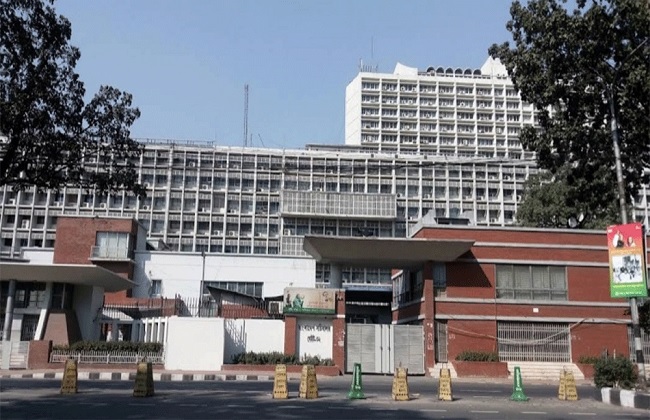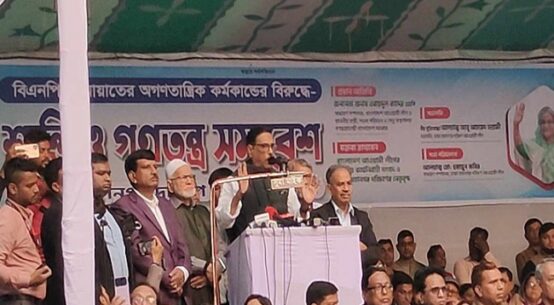
Bangladesh’s interim government is grappling with a significant administrative slowdown since assuming power in August.
Ministries, including the Ministry of Public Administration, are facing sluggish work progress, and development projects appear similarly stagnant. An environment of uncertainty and fear is palpable among government officials, which is contributing to the slowdown.
A visit to the Secretariat revealed apprehension among officials across various departments. There is widespread concern regarding transfers or potential reassignment to less desirable roles, particularly among those appointed or promoted during the Awami League government.
As a result, there is little momentum in executing tasks. Several ministries still have secretaries from the previous government, who are also anxious about being made Officers on Special Duty (OSD) or facing enforced retirement.
Meanwhile, eight secretaries, who had been deprived of promotions during the Awami League tenure and have now been reappointed on a contractual basis, are encountering challenges in adjusting to their roles. The current officers who held positions under Sheikh Hasina’s administration appear hesitant to fully accept them, which has resulted in slower operational progress. “These new appointments are struggling to match up with others as they return to the administration after long gaps in service,” an official noted.
Some key ministries reported that interim government advisers have instructed budget cuts for projects initiated during the previous administration. Advisers are taking time to understand ongoing projects, and in some cases, work has been halted. There are no signs that the interim administration plans to introduce new projects, adding to concerns about the overall development pace.
In addition to project-related delays, various field-level development tasks and social allowances are not being disbursed properly. Complaints have emerged, particularly about pensions for widows, the elderly, and people with disabilities under the Ministry of Social Welfare. Rural development projects under the Ministry of Disaster Management and Relief, such as “Kabita” and “Kabikha”, are also stalled.
Sharmeen S Murshid, adviser to the Ministry of Social Welfare and the Ministry of Women and Children Affairs, attributed the difficulties to resistance from existing government staff. “Whenever a government assumes office, it needs its own team,” she remarked at an event this week. “The old team has to step aside for things to function smoothly.”
Asif Mahmud Shojib Bhuiyan, adviser to the Ministry of Labour and Employment and the Ministry of Youth and Sports, echoed similar concerns, stating, “A revolution has taken place in our country. After a revolution, things do not function as they did before, yet we are clinging to the previous system. Some members of the administration are creating stagnation through non-cooperation. If needed, the government will consider replacing uncooperative officials.”
Acknowledging the stagnant work environment, Nahid Islam, the Information and Broadcasting Adviser, said during a press conference last month, “Yes, there is stagnation in the administration. We are observing this and facing non-cooperation from various places. Hopefully, the stagnation will dissipate soon.”
The lack of appointed secretaries in at least seven ministries and divisions further exacerbates the issue. Additional secretaries managing these departments are only performing routine tasks without making any policy decisions, contributing to the overall lack of progress.
Amid this slowdown, officials from various batches who have been deprived of promotions are demanding proper placement in senior positions. At least 100 officials appointed on a contractual basis during the Awami League regime have had their contracts terminated. Conversely, eight officials who had been sidelined during Hasina’s tenure were reappointed as secretaries and subsequently promoted to senior secretary positions.
Among these appointees, Dr Sheikh Abdur Rashid, Md Siraj Uddin Mia, Dr Mokhles-ur-Rahman, Dr M.A. Momen, M.A. Akmal Hossain Azad, Ehsanul Haque, and Dr Nasimul Ghani are now said to have significant control over the administration. In addition, Siddiq Zobair and A.S.M. Saleh Ahmed have been appointed as senior secretaries in the education and land ministries, respectively.
Promotions have been scarce for long-serving officials from other batches, sparking discontent. Some argue that even junior colleagues have surpassed them in rank. Abu Mohammad Yusuf, a retired additional secretary, lamented, “Despite being qualified, I was not made a secretary. Officials who were junior to me have now taken senior positions.”
Dr Mokhles-ur-Rahman, Senior Secretary of the Ministry of Public Administration, explained that addressing these issues, which have persisted for over 16 years, would take time. He expressed optimism, saying, “We hope to complete the placement of suitable individuals in all ministries and departments soon, which will then accelerate progress.”
The interim government faces significant challenges as it attempts to restore momentum in the administration while managing the demands of marginalised officials and overcoming resistance within the ranks.


